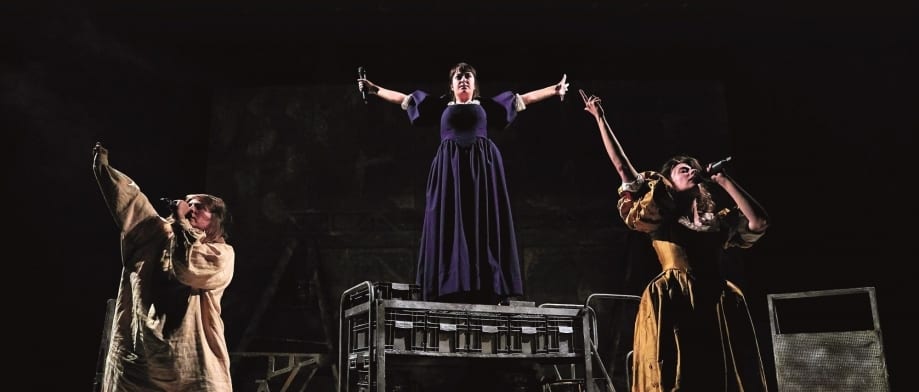In 1612 the young artist Artemisia Gentileschi took the highly unusual step of making an accusation of rape against Agostino Tassi, a favourite painter of the pope. This case came to trial and remarkably, the transcript of the proceedings survives and forms the basis of this dramatic adaptation. There are three central performers here who take on a variety of roles in the courtroom but the chief action is a triangular contest between Artemisia, Agostino, and Tuzia Medaglia, Artemisia’s vacillating and inconstant chaperone. At points the trial scenes are opened out by director Billy Barrett to include musical episodes and re-enactments of two of Artemisia’s most famous paintings.
While the point is made that Gentileschi’s creative life was long and varied and not defined or limited by this episode, the central thesis is that this searing experience shaped her choice of subject matter and intensity of focus on becoming a fully independent and successful female artist on her own terms. The play and the performances impress because of the careful but raw blending of both degrading personal experience courageously faced down and its implications for the expression of feminine creativity, the depiction of women in art through the male gaze, and the imperatives of a feminist perspective in art’s history and practice.
The play runs for an hour and a quarter and could lose the quarter to advantage: what is on the already remarkable page of the trial transcript does not need over-amplification and some time is wasted in two separate investigations of the influence of this episode on the creation of perhaps Artemisia’s most famous painting, “Judith beheading Holofernes.” The final gruesome apotheosis loses some of its power as a result. But most of the rest has a grim intensity flecked with moments of humour that is consistently engrossing to watch and sometimes still manages to shock across the centuries.
All the cast distinguish themselves: Ellice Stevens has a huge amount to do in the central role conveying both the integrity and creative flair of Artemisia as well as her bravery in defying both her vitriolic accuser and torture with the thumbscrews to test her veracity (so much for the court’s value of her as an artist!). There is a lovely moment of technical acting in which she re-enacts the central subject matter of “Susannah and the Elders,” one of Artemisia’s contemporary canvases, from the perspective of both a male and female artist. This is an exquisite distillation of both story-telling and a teaching moment in the theatre.
In the other roles Sophie Steer enjoys herself immensely as the irredeemably arrogant, narcissistic and entitled rapist Agostino, whose swaggering effrontery and brutal chauvinism were extreme even by sixteenth-century standards. There is some subtle playing from Kathryn Bond as the down-trodden Tuzia, who initially kowtows to Agostino and then makes up for her betrayal of Artemisia in a moment of feminist solidarity. Harriet Webb joins them in the final few minutes as a golden and avenging incarnation of Judith, though veering into Dawn French territory momentarily.
This devised scenario was a great success at Edinburgh and was due to open at the Barbican this April. We have the opportunity to see it now through a BBC film shot at The Space in Docklands. There are both advantages and disadvantages to this streamed format. The soaring formal architecture of the former chapel that is The Space provides exactly the right kind of imposing historical and official framework for what is essentially a court room drama. The camerawork is imaginative and aims to do more than simply register the back and forth of the dialogue. You get a good sense of the fluidity of the staging and careful selection of useful and uncluttered props. However, the very faithfulness of this record of the original stage production can be a problem. The performances are shouty and large-scale, which was doubtless right in live performance, but comes across as overbearing and self-consciously relentless on the small screen.
While it is a shame we won’t see this play at the Barbican at present, where it would have made an undoubted impact, this filmed version nevertheless performs a real service in bringing this extraordinary historic episode to effective theatrical life and teasing out its broader implications and resonances for the #MeToo era.

